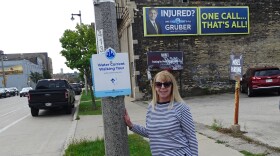Tia Nelson was one of thousands of people who closely observed the recent United Nation’s climate change conference in Paris. The 13-day, nonstop negotiations culminated in an international climate agreement.
Nelson’s interest runs deep, starting with the fact that she is daughter of Earth Day founder and former U.S. Senator Gaylord Nelson.
It had been years since Tia Nelson attended a U.N. conferences on climate change; however, she participated in nearly a dozen when she led climate change programs with the Nature Conservancy.

What struck her this time was that the stakes are higher - as climate impacts increase, and that hundreds of new players attended the Paris gathering.
And it wasn’t just official delegates.
Nelson says a massive delegation of governors and mayors were there. "And mayors are hugely important because I think more than 50 percent of greenhouse emissions are generated in cities; and there's an interesting nexus between what mayors are trying to do to make their cities more livable...and these are great opportunities to in essence marry efforts to reduce greenhouse gas emissions with efforts to make our cities more livable, more functional, safer, cleaner and healthier," she says.
Nelson says corporations have dramatically shifted positions since she was last on the scene.
“There were over 800 corporate CEOs there to support an agreement. This is a big difference. Corporations see climate change as a risk to their business, they’re assessing that risk and what they need to do. And it’s really interesting dynamic to see industry leading and in some cases far ahead of their own government,” Nelson says.

The United States’ pledge for reducing its carbon emissions is the EPA’s controversial Clean Power Plan. It calls for reducing carbon emissions from existing coal-burning plants – 32 percent by the year 2030.
Wisconsin is one of 27 states that have filed a lawsuit to try to stop the plan, insisting it will be too expensive, including for utilities that burn coal and businesses that use lots of energy. But, in Nelson’s opinion, the Badger State has dug in its heels even deeper than the rest.
“It’s critical that each state have a conversation with their citizens, their stakeholders, utility companies, manufacturers, rate players ….about what future we want for Wisconsin. And unfortunately Wisconsin is the only state in the country that is refusing to do that,” Nelson says.
Nelson believes businesses and utilities alike are looking for regulatory certainty. And she insists they’d rather have a voice in crafting a plan than having the federal government impose one on Wisconsin.
"In my opinion, true leadership would be asking the Public Service Commission and the Department of Natural Resources to have a conversation with citizens and companies about opportunities tailored for Wisconsin by Wisconsinites; that’s what we should be doing. There are pros and cons about what our energy future should look like. Let’s have the discussion,” Nelson says.
Nelson sees corporations, including Wisconsin’s own Johnson Controls, taking the lead in driving climate initiatives, and she believes scientists should do a better job of communicating what is at stake at a very basic level; for example, Wisconsin’s favorite trout streams.
“The brook trout population, if we don’t reduce our emissions and avoid the more severe impacts of climate change, the decline of trout fishing in the state will be over 80 percent. We need to find new ways to talk about these impacts that make it local, immediate, real and also gives people a sense of empowerment and hope,” Nelson says.
Nelson isn’t willing wager how the multi-state lawsuit against the EPA will play out.
She does reflect on the energy she experienced at the Paris talks and how nations came together, despite their differences.
She says if Wisconsin leaders possessed even a fraction of the charge, the conversation here might be more one of compromise than confrontation.







